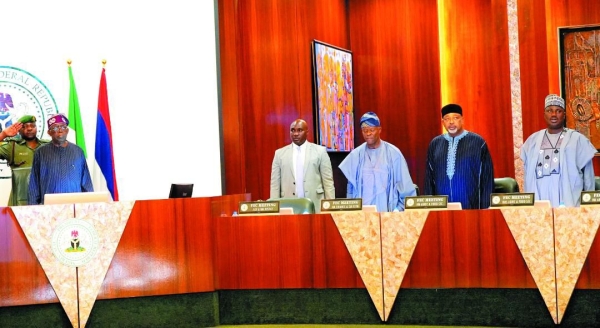The federal executive council (FEC) has approved N740 billion for the construction of the Kano-Abuja road project.
The approval was given on Wednesday during the weekly FEC meeting presided over by President Bola Tinubu at the State House in Abuja.
David Umahi, minister of works, who briefed State House correspondents after the meeting, said the government is working on managing the extensive backlog of infrastructure projects.
According to Umahi, the Abuja-Kano road, previously slated for a tax credit arrangement, “will now be procured without such a provision, with the 162-kilometer Berger section already approved for N740 billion”.
The minister also announced that the Shagamu-Benin road is undergoing critical rehabilitation, while procurement processes are being finalised for its full reconstruction using reinforced concrete pavement.
He highlighted other projects undergoing review, including the commencement of construction on the Sokoto-Badagry road, with the Sokoto section to be flagged off imminently.
Umahi also said works on the Oyo-Ogbomosho road, a project stalled for 18 years, will resume, and the Makurdi-Katsina-Ala road will undergo significant repairs.
“FEC also tackled the inherited debt profile of N1.6 trillion tied to 2,604 projects, with a total contract value of N13 trillion,” Umahi said.
To manage the backlog, the minister said the ministry of works has initiated a phased approach to project completion based on available funding.
Umahi said examples of projects in the category are the phasing of the Biu-Kangiwa-Kamba-Kaya Niger Republic road in Kebbi state, the Yola-Hong-Mubi road in Adamawa state, and the Kachako-Dambazua road in Kano state.
On July 29, the FEC approved N1.4 trillion for some road projects across the country.
‘30% ADVANCE PAYMENT TO CONTRACTORS’
Umahi said the council approved advanced payment mechanisms to combat inflation and rising costs driven by fluctuating exchange rates and petroleum prices.
“And finally, we presented a memo to FEC that where there is proof of funds, there is available funds, the Procurement Act allows MDAs to pay a maximum of 30 percent advance payments. And let me emphasise that this advanced payment. When you read the law, it say may pay,” Umahi said.
“And so when people are giving contracts and they don’t mobilise, and they said, I’ve not paid mobilisation, it is not legally binding, because the word says may pay. And so some people turn it (to) shall pay. So no, it’s may pay.
“So where we have funds, and they will have a valuable fund beyond this 30% so what we are, you know, we requested from FEC is approved, that we first pay 30% which is the Procurement Act, and not more, and then when the contractor has started work, and to the satisfaction of the Ministry of works, we should be allowed to pay additional funds.
“Yes, the law allows us to pay in terms of you know, materials on site. But we are asking beyond that, what is the essence of this? Is to mitigate a lot of fluctuation and inflation, because we have a lot of you know, indices that affect the ministry of works like the petroleum you know it affects it.”
The minister also said the dollar exchange rate affected negotiations, adding that the ministry is “doing everything to manage the resources within the available funds so that we mitigate inflation”.
Year-to-date, the naira has depreciated by 59.79 percent in the official window, declining from N1,035.12 per dollar on January 3, to N1,654.09/$ on October 23.
In the parallel market, the naira has depreciated by 40.65 percent, from N1,230/$ to N1,730 per dollar, within the same period.


